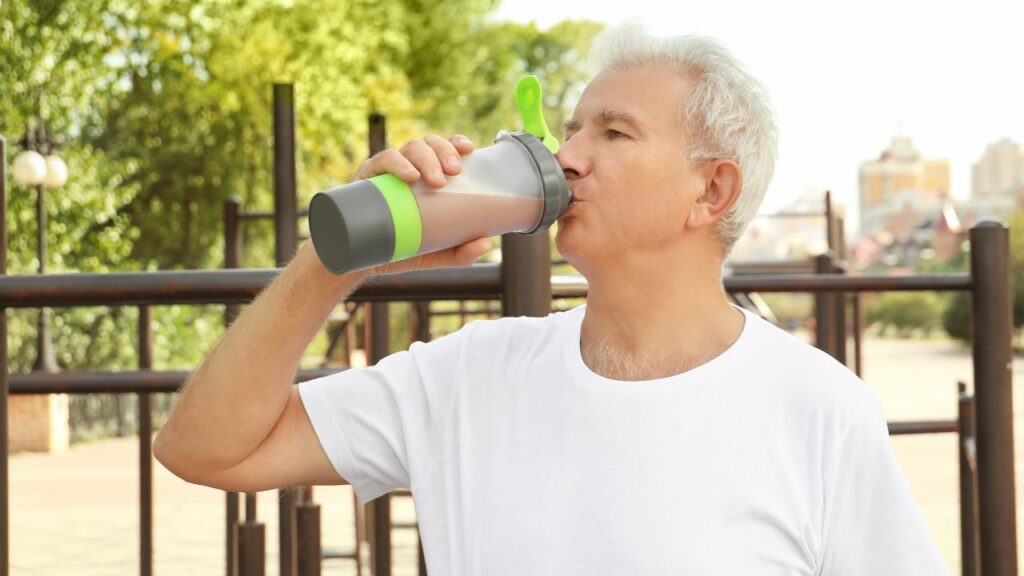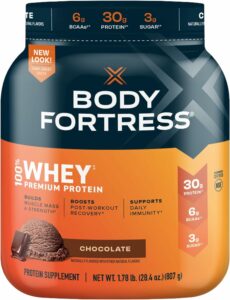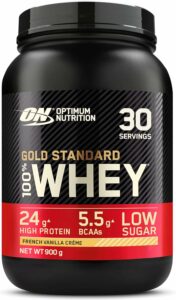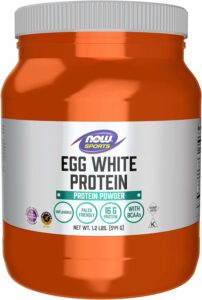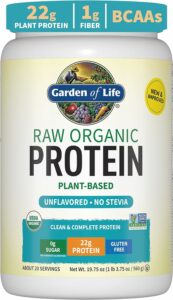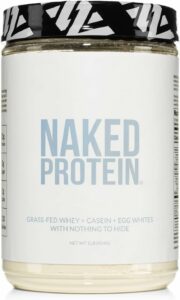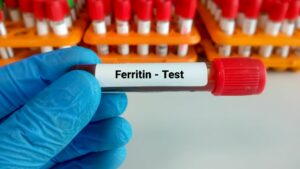There are a lot of changes that occur in the body as we grow older. Loss of muscle mass and general strength is perhaps the most obvious that we see and feel aside from wrinkles on your face and white hairs appearing on your head.
Research has shown that muscle mass decreases by up to eight percent every decade from age thirty onwards. This rate speeds up during your 50s and 60s.
This condition is known as sarcopenia, and it is a normal and inevitable part of growing old. This can cause loss of overall strength and can make you susceptible to injuries and other concerns.
Still, you can do a lot of things to slow down the progression of muscle loss, even in your 50s. We will discuss these methods as well as the best protein powder for men over 50.
Table of Contents
What is Sarcopenia?
Sarcopenia is defined as the “age-related progressive loss of muscle mass and strength”. This is a naturally occurring process that we can only slow down but not stop entirely.
Those who are suffering from muscle loss are those who are aged 60 years and above, although minor muscle loss can progress way before that. The progression of this condition will also depend on various factors such as age, BMI, ethnicity, genetics, and lifestyle.
Inflammation and some chronic diseases are also some of the leading causes of muscle loss in older males.
This condition causes a decrease in muscle mass and a general loss of strength. This is caused by the muscle fibers in your body decreasing in both number and size.
The body will also not be able to convert protein, a nutrient necessary for muscle growth, as optimally as you did when you were younger. Production of growth hormones such as testosterone will also be reduced.
Muscle loss will result in numerous changes, especially when it comes to mobility. Those who suffer from muscle loss will have more difficulty in doing regular physical activities such as climbing stairs.
Your walking speed would most likely be reduced. Your balance would also suffer, increasing the risk of falls and fractures. You will also feel reduced stamina.
How to Prevent Muscle Loss as You Age
While there is really no way to prevent muscle loss as we age, there are ways by which we can slow down its progression and reduce its impact on our bodies even as we reach an advanced age.
Resistance Training
Resistance training for a few sessions a week is considered as one of the most effective ways to build and maintain muscle mass. Simply body weight exercises as well as going to the gym regularly can help slow down muscle loss in men over 50.
Vitamin D Consumption
A lack of Vitamin D in the body provides numerous issues, among them is the increase of the risk of muscle loss. Eventually, this will cause a condition called dynapenia which is similar to sarcopenia but is related more to loss of muscle strength rather than muscle mass.
Vitamin D can be acquired through sun exposure, through foods, or through taking supplements.
Walking
For those who cannot do regular weight training, walking has also been proven to delay the atrophy of muscles. Walking for 30 minutes a day will help keep muscles active and strong.
The effect is compounded if walking sessions are combined with resistance training, even if not done on the same day.
Protein Consumption
One of the best ways to slow down muscle loss is by eating more protein. Protein is considered a muscle-building nutrient, and those who want to build muscle and maintain it do so by consuming larger amounts of protein than usual.
Men typically need about 0.36 grams of protein per pound of their body weight. However, to prevent premature muscle loss, those who are older may need to consume slightly more than that.
For men who are 50 years or older, you must consume 0.45 grams per pound of your body weight, along with regular weight training and a proper diet, in order to prevent muscle loss early on.
Protein can be acquired from various sources. Beef, poultry, eggs, yogurt, peanut butter, seafood, vegetables, dairy, as well as nuts and seeds are some of the richest animal and plant-based sources out there.
Alternatively, you can get your recommended dosage of protein through supplements, mostly in the form of protein powders.
Different Types of Protein Powder
There are different types of protein powders, with each having its pros and cons. The main differences between each type of protein powder are where they were sourced and how they were manufactured.
Whey protein is perhaps the most popular type of protein powder. Whey protein is derived from milk and is subdivided into three main categories, namely concentrate, isolate, and hydrolysate.
These three types of whey protein vary in terms of the amount of protein, carbohydrates, fat, and lactose that they have on a per-weight basis.
Whey proteins are typically considered the best protein powder for men over 50 due to their capability to be absorbed quickly by the body and the numerous reviews proving their effectiveness.
Casein protein is another type of protein powder that is derived from milk. Compared to whey protein, casein protein is absorbed more slowly, a quality that is preferred by athletes who often drink this before bed.
Egg protein powder is a good alternative for those who are lactose-intolerant. Sourced from egg whites, egg protein powder is also relatively low in calories, but is slower to digest than whey.
Soy, pea, rice, and hemp protein are vegan alternatives to protein powder. They are also good for lactose-intolerant individuals.
However, these types of protein powders often lack a complete amino acid profile, so pairing two of them together is recommended to get the most benefits.
There are several other types of protein powders that you can find in the market. However, the ones mentioned above are the most widely used.
Best Protein Powder for Men Over 50
It can be hard to determine the best protein powder for men over 50. This is because of the varying needs and preferences that you or your body may have.
Regardless, you will not go wrong with the products listed below whether you require whey, non-dairy, or vegan types of protein powder.
1. Body Fortress 100% Whey Premium Protein
Body Fortress 100% Whey Protein Premium provides 30 grams of protein per scoop. It uses a combination of whey protein concentrate and whey protein isolate in its blend.
It also contains other nutrients and minerals such as sodium, potassium, calcium, and iron as well as Vitamins C, D, and zinc for both muscle growth and boosting the immune system.
Pros
- Comes in many flavors and sizes
- Can be blended into delicious shakes or smoothies
- Fast-absorbing protein blend
Cons
- Contains sugar and cholesterol
- Contains nuts so it may cause allergies
2. Optimum Nutrition Gold Standard 100% Whey
Each serving of Optimum Nutrition Gold Standard 100% Whey contains 24 grams of protein in the form of whey protein isolate, as well as over 5 grams of branched-chain amino acids, or BCAAs, and 11 grams of essential amino acids
Optimum Nutrition Gold Standard 100% Whey also comes in a lot of different flavors such as French Vanilla Cream, Peanut Butter Chocolate, Strawberries and Creme, Chocolate Mint, and many more.
Pros
- Comes in a multitude of flavors
- Good for lactose-intolerant people
- Easy to mix
Cons
- Can be a bit expensive
- Not the best-tasting product out there
3. NOW Sports Egg White Protein
NOW Sports Egg White Protein has 16 grams of protein, derived from egg whites, with each serving. It has a good amino acid profile, containing 9 BCAAs and 9 EAAs.
The product does not contain any of the usual allergens such as soy, wheat, gluten, nuts, milk, fish, or seafood. This makes it a good choice for those with certain allergies.
Pros
- Low carb, low sugar
- Free of allergens
- Unflavored, so you can mix in your own flavors
Cons
- High in sodium
- Can be hard to blend
4. Garden of Life Raw Organic Protein
Garden of Life Raw Organic Protein provides 22 grams of plant-based protein per serving. Proteins are derived from sources such as peas and rice. Some protein is also acquired from lentils, soybeans, buckwheat, sunflower seeds, and various others.
Garden of Life Raw Organic Protein has an amino acid profile comprised of 18 BCAAs and EAAs. The product also contains minerals including over 50% RDA of Vitamin D as well as 10% RDA of iron. It is also unflavored and easy to mix with other liquids.
Pros
- Vegan formulation
- Guaranteed kosher and organic
- Does not contain sugar
Cons
- Not the best-tasting protein powder
- Small number of servings for the price
5. Naked Protein Whey + Casein + Egg Whites
Naked Protein contains whey protein, casein protein, as well as egg white protein. This gives you the advantages of all these proteins for a complete amino acid profile.
Each serving contains 29 grams of protein as well as 250 milligrams of calcium, 2 grams of iron, and 140 milligrams of potassium.
Pros
- Blend of most effective proteins
- No added sugars and low-carb
- Soy and gluten-free
Cons
- Very foamy when blended
- Lots of packaging concerns, especially with the lid and half-empty container
